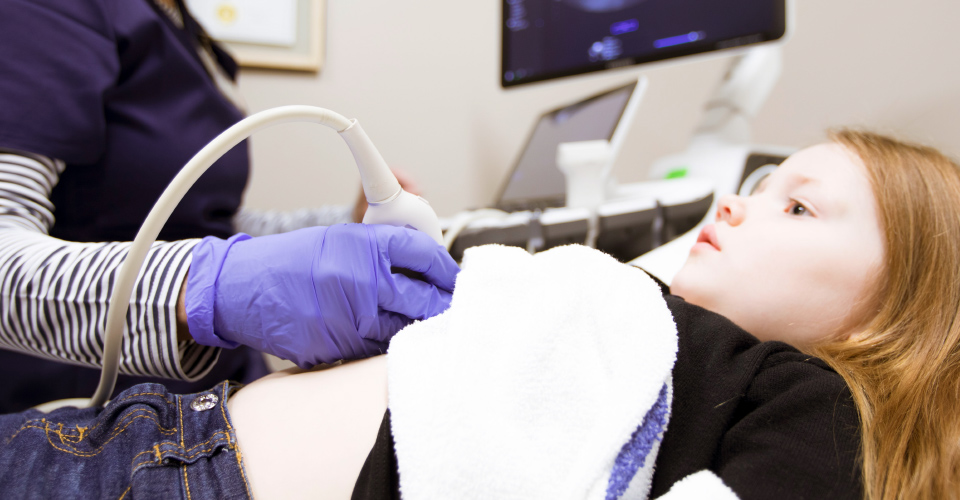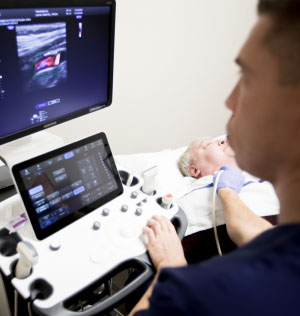Abdominal Ultrasound
An Abdominal ultrasound can sometimes be referred to as a stomach ultrasound, although this term is not accurate because ultrasound typically does not look at the stomach. An abdominal ultrasound examination (or sonogram) is an important part of diagnostic care, typically performed on patients who are experiencing abdominal or stomach pain or may have abnormal lab results (abnormal bloodwork).This exam is used to assess the abdominal organs, and it can help detect abnormalities or other health conditions related to the liver, gallbladder, pancreas, kidneys, spleen, abdominal aorta, and urinary bladder.
What Can an Abdominal Ultrasound Detect?
Abdominal ultrasounds can aid in detecting cysts, tumors, liver disease, gallbladder stones, kidney (renal)stones, abdominal aortic aneurysms, as well as other health concerns. The imaging from an abdominal ultrasound examination is helpful in the diagnosis of health problems related to the abdominal organs.
Reasons Why Your Care Provider Might Prescribe an Abdominal Ultrasound
An abdominal ultrasound is commonly recommended by your doctor if you are experiencing abdomen pain or bloating, if you have abnormal lab results, or to diagnose certain health conditions such as:
- Abdomen, stomach, or mid epigastric pain
- Pyloric stenosis
- Bloating
- Gallbladder stones
- Kidney stones
- Pancreatitis
- Suspected AAA (abdominal aortic aneurysm)
- Appendicitis
- Hernia
- Cancer
Preparation for an Abdominal Ultrasound
A patient undergoing an abdominal ultrasound is generally asked not to eat or drink anything for up to 8 hours. There sometimes are exceptions to this rule. You may take your medication with a small amount of water (not juice, soda, or milk). In some cases, you may be asked to refrain from smoking or chewing gum prior to the exam. It is best to come wearing loose clothing, however, you may be asked to put a gown on to protect your clothing from the ultrasound gel.
How Long Does an Abdominal Ultrasound Take?
A complete abdominal ultrasound generally takes up to 45 minutes to complete.
A limited abdominal ultrasound takes approximately 30 minutes to complete.
Complete Abdominal Ultrasound
By definition, a complete ultrasound examination of the abdomen consists of real time scans of the liver, gallbladder, common bile duct, pancreas, spleen, kidneys, abdominal aorta, and inferior vena cava, including the demonstration of any abdominal abnormality.
Limited Abdominal Ultrasound
A limited abdominal ultrasound may be ordered to follow-up on a single organ. It is often ordered for a single quadrant, such as the right upper quadrant (RUQ) for right upper abdomen pain. When this is ordered, a healthcare provider is more interested in a specific organ, such as the gallbladder or liver.
Does an Abdominal Ultrasound Hurt?
Abdominal ultrasounds, although at times may be uncomfortable, they are not considered to be painful.
Can Children Have Abdominal Ultrasounds?
Yes, ultrasound is safe for children to have, and, unlike x-rays or CT (CAT) scans, it does not use ionizing radiation to create an image. When appropriate, ultrasound is preferred over x-ray or CT as to not expose a child to unnecessary radiation. Ultrasound imaging is important for helping the healthcare provider identify abdominal concerns such as appendicitis in children.
Abdominal Aorta Screening
Abdominal ultrasounds are also used for screening purposes, even if a patient is not experiencing abdominal pain. Doctors will recommend abdominal aorta screenings for men between the ages of 65 and 75. Men who fall within thisspecified age groupandsmoke are at higher risk for an abdominal aortic aneurysm (AAA). An abdominal aorta ultrasound screening can determine whether they have an AAA which can be life threatening if gone undiagnosed.A confirmed abdominal aortic aneurysm, will aid a healthcare provider on the next steps for treatment.
Medicare Part B covers a one-time AAA ultrasound if you are at risk for AAA and you receive a referral from your provider. Medicare considers you at risk for AAA if:
- You have a family history of AAA
- Or you are a man age 65-75 and have smoked 100 or more cigarettes in your lifetime.
Keep in mind that Medicare only covers the AAA ultrasound screening once in your lifetime. If you develop symptoms of a AAA or a AAA is detected at your screening, your healthcare provider may order a complete abdominal aorta ultrasound. However, without symptoms, Medicare may deny coverage for a 2ndaorta screening. This means you would be responsible for the full cost of the service. Be sure to ask why your provider is recommending that you receive more than one AAA ultrasound screening and how much you may have to pay for it.
Diagnostic ultrasound care such as abdominal aorta screening is an important part of preventative medicine. After an abdominal aorta ultrasound screening, the results will be shared with your healthcare provider which will allow them to determine the best next steps of your care.
If you or your loved one are in need of a Medicare abdominal aorta ultrasound screening, contact our office to set up an appointment. If you live in a surrounding rural community, or reside in a long-term care or assisted living facility, our team can go to you through our mobile outreach service. Our team of expert sonographers will conduct the examination, and the results from your exam will be shared with your healthcare provider. At Transmed, we provide quality, comfortable ultrasound exams that quickly offer healthcare providers accurate results.
Screening America, our sister company, also provides Vascular screenings, sometimes known as stroke screenings. This particular screening is done as preventative care for the early detection of certain health issues, such as abdominal aortic aneurysm (AAA), stroke, peripheral arterial disease (PAD), and irregular heartbeat. This screening does not require a physician’s order, however, we feel it best to always communicate openly with your healthcare provider.



